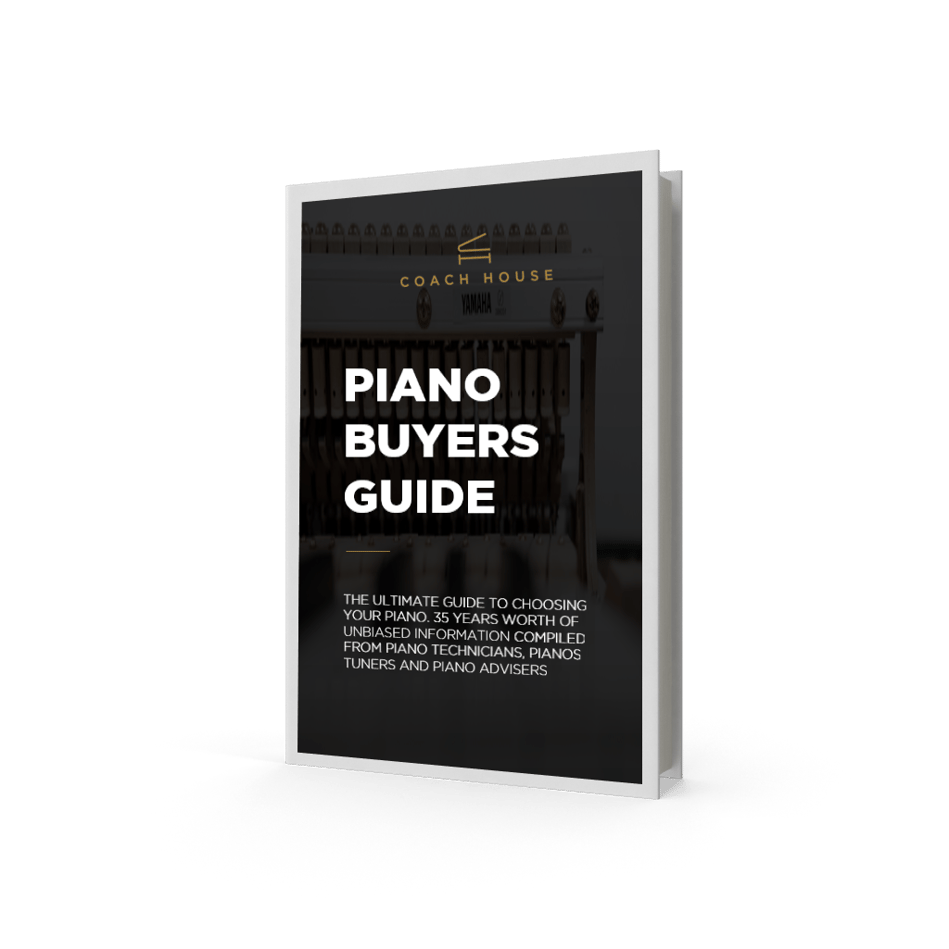There may be many reasons why you want to sell your piano and not simply give it away. Perhaps it’s time to upgrade or downsize, or maybe you have inherited a piano but are not making good use of it.
There are many people searching for grand, baby grand or upright pianos on the second-hand market. Pianos are built to out-live us and whilst they may need restoring after 40 years or so, in the main, they need never be retired. The used piano market is therefore a popular one.
How to sell a piano
There are four main options:
-
Selling your piano privately - perhaps via word of mouth
-
Selling to a dealer - who will service, regulate, and carry out any repair works both internally and externally before warrantying and selling through their showrooms.
- Selling at auction
- Selling on Online Markets - such as Facebook Marketplace, Ebay or Gumtree
Table of contents:
- How much can you sell a piano for?
- Determining a pianos age
- How do I value my piano?
- Piano Dealer purchasing your piano
- Selling via classifieds
- Selling at Auction
- Which pianos hold their value?
- Do digital pianos hold their value?
- How much is an average piano worth?
- How much is a digital piano worth?
- How much is a grand piano worth?
- Are antique pianos worth anything?
- Is my piano an antique?
- Pianos for sale: A fair price?
- Add your piano details to a piano database
- Part exchange your piano
- Sell your piano
How much can you sell a piano for?
If you are thinking about selling your acoustic piano, you can of course try advertising to sell your piano privately online.
You may have already considered uploading adverts onto online classifieds like Ebay, Facebook Marketplace, Gumtree and Preloved, or you may know of some dealers or piano stores that you wish to contact first for some advice.
But first, consider whether your piano is suitable for resale. You can do this by looking at its brand, condition and appearance before advertising to sell online.
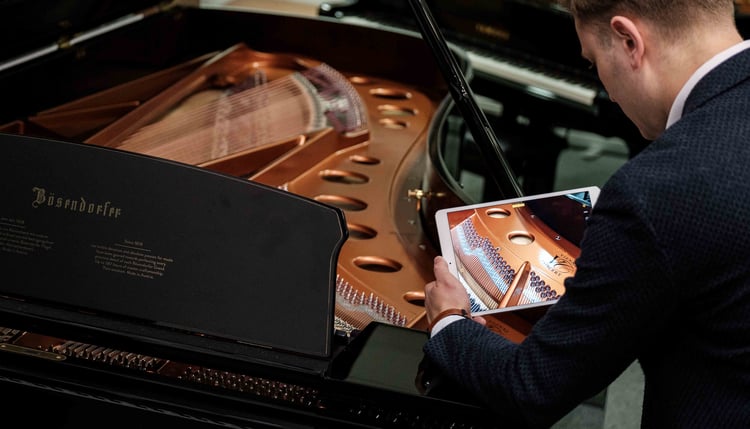
Brand
Well-known brands with good reputations will generally generate more interest and be valued higher than brands that lack name and/or quality recognition.
Some of the most saleable current market brands include Bosendorfer, Steinway & Sons, Bechstein, Sauter and Yamaha. Do get in touch with us if you'd like to find out more about which piano brands are popular, and more importantly, saleable.
Condition
A piano’s age alone tells us very little about its actual condition; how much it has been played or how well it has been maintained. A potential buyer will be interested in the piano’s use and maintenance history, so make this available.
Older pianos that are likely to attract most interest include:
-
High-quality brands, such as Bechstein, Kawai, Bösendorfer, Yamaha, Steinway & Sons and Sauter.
-
Used pianos that have been completely renovated using only genuine and authentic materials and parts.
-
Instruments that, due to low use and favourable environmental conditions are still in exceptional condition.
Appearance
As well as a musical instrument, people also value a piano as a piece of furniture, which means that many pianos that play well may not be saleable if they don’t also look the part.
Determining a Piano's Age
The piano’s serial number helps determine a piano’s age, as well as the country where it was manufactured - which will both be of interest to any potential buyer.
The serial number can vary from piano to piano, consisting of either numbers and letters or just numbers. This depends on the make, model and brand of the piano, and in some cases is dependent on the country in which the piano was produced if the manufacturer has multiple factories, as is the case with Yamaha, Kawai and Steinway.
The serial number is usually printed on the frame, or sometimes on the soundboard if it is a grand piano.
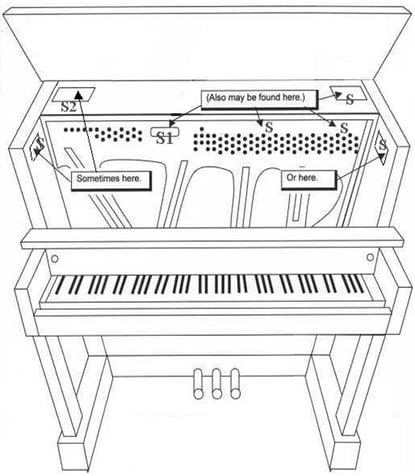
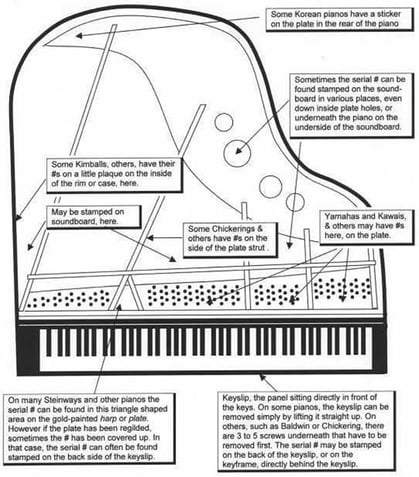
How do I value my piano?
Valuing your piano has to be the first step in selling your piano. The market value of a piano depends mainly on the interior condition, age, and how well it has been maintained.
However, the casework condition is also an important factor since a cabinet in good condition will be far more desirable as a piece of furniture (as well as a quality sounding instrument). Therefore, cabinet scratches, chips and fading will negatively impact a piano’s desirability and value.
If your piano is a well-regarded brand, such as Kawai, Steinway or Yamaha and is less than 25 years old, then it will usually have a high value and many potential buyers interested in purchasing.
With all this in mind, when you want to sell your piano, you’ll need to establish an accurate valuation based on the above, and ask potential buyers for a fair price.
It’s a good idea to seek help by consulting a local piano dealer or hiring a piano tuner who may already have a consignment of pianos to sell.
Piano dealer purchasing your piano
To get an honest valuation it is a good idea to let a piano dealer, like Coach House Pianos, know if you are considering selling privately. You could then also discuss with them if they would be interested in purchasing your piano themselves, and for what price.
Coach House Pianos has over 30 years' experience in buying and selling pianos and will always give an honest and fair purchase price.
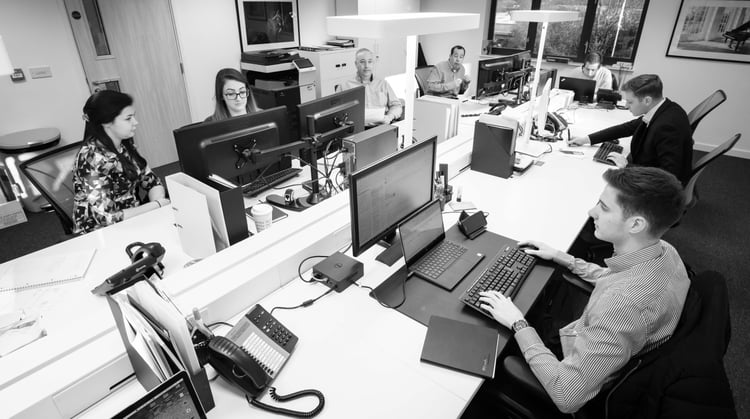
Selling via classifieds
When looking for a buyer, you may want to consider other options aside from calling someone from the classifieds.
It may happen that the potential purchaser is not an expert in pianos and values your piano too low; they may end up paying a fraction of the actual value of the piano.
Pianos are complicated instruments with thousands of moving parts, so to accurately value a piano to sell, you would need the expertise and knowledge of someone who has been in the piano industry for many years, or has at least been on a piano tuning and repair course for between 2-3 years. Coach House Pianos has been buying, restoring and selling pianos for 35 years.
Selling at Auction
Selling at auction is another option if you are hoping to sell your piano. However, you could save money on commission fees by opting to sell directly to a piano dealer like Coach House Pianos. This way you won't lose out on 30-40% of the pianos value and you won't have to worry about transportation.
Which pianos hold their value?
When you are selling your piano, whether to a dealer or online, how do you know which pianos hold their value? What is it based on: make, model or brand?
Pianos are a fantastic investment for the joy of making music and providing a lifetime of playing pleasure, however, there are a few general principles that determine just how much value a piano will hold over time.
First of all, remember that pianos often decrease in value. In the same way as a car begins to depreciate as soon as you drive it off the forecourt of the dealership, a piano can start to depreciate as soon as it arrives in your home.
They can lose as much as 20 percent in the first year alone and continue to move downward. But as the piano approaches the 10th year, the depreciation slows significantly.
The piano’s value and level of depreciation depends on a variety of factors:
- Brand
- Condition of the piano
- Current instrument market value
- Age
In general, grand pianos appreciate more than upright pianos. This is typically because they are more expensive in the first instance and therefore manufacturers constantly increase prices of the new equivalent model, the % increase results in a greater increase in currency amount too. For example, a 5% price increase on a grand piano of £50,000 is £2,500, whereas a 5% increase on an upright of £15,000 is only £750.
Higher quality pianos increase more in value than less expensive ones, with Steinways appreciating the most. However, many other piano brands can increase, or at least hold their value.
Do digital pianos hold their value?
Digital pianos depreciate fairly quickly, especially when a new model supersedes the original. Typically, digital pianos depreciate to 78% of their value in the first year alone.
How much is an average piano worth?
The valuation of used pianos is very difficult to average, as they vary wildly. Value can depend on local supply and demand, the condition of both the interior and exterior of the piano and any restoration work that has been carried out, or that needs carrying out.
Value is very subjective too. Just think of those sayings: ‘Beauty is in the eye of the beholder’ or ‘One man’s trash is another man’s treasure’. Each potential buyer will have a slightly different view of your piano’s worth.
Being established names in the piano world, Steinway and Sons, Bechstein, Blüthner and Bösendorfer are amongst those well-regarded brands that often sell well on the used pianos market.
If your piano, no matter what brand, requires expensive repairs, these will need to be accounted for when considering your asking price.
How much is a digital piano worth?
If you would like to sell your digital piano, you will find that a recognized brand, such as Yamaha Clavinova, Kawai or Roland that offer a reasonable approximation of a real piano in terms of touch and sound, will hold their value at around £300 - £1000 depending on age, model, condition etc.
How much is a grand piano worth?
Many people aspire to own a grand piano, although cost and space can be an issue when looking to purchase one for your home. So, how much can you buy a grand piano for?
Grand pianos come in a variety of different sizes, and in a healthy market it’s difficult to give an average price on second-hand models. A new grand piano, however, starts at £7,500 as a minimum.
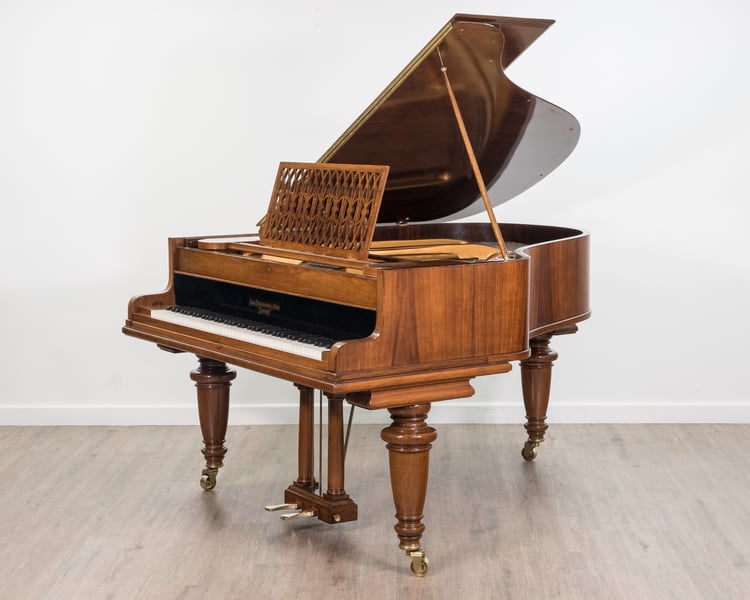
Are antique pianos worth anything?
In the early to mid-part of the 20th century, the piano was a fundamental part of many homes – being the main source of home entertainment. It was a substantial investment for most, and for decades, many of the pianos continued to play well and were often passed down through the family.
If you own a piano from a reputable brand such as Steinway & Sons, Sauter, Bösendorfer or others you will find that these retain their value very well.
Other pianos that have a specific heritage can also be very valuable. It is always worth asking an expert to see whether your antique piano might be worth anything on the second-hand piano market.
Is my piano an antique?
The first question you may have when thinking of selling a piano is, “Is my piano an antique?”
An antique piano is one which is at least 100 years old.
Older pianos are not built with tropicalised timber like all pianos are today (and those built from the 70s onwards). It’s often the wrest plank (that holds the tuning pin), that gets splits in it over time, meaning that the piano can no longer hold its tune and this is extremely costly to replace, requiring many workshop hours.
There is a real difference in value between a restored and well-tuned instrument and an original, unrestored antique instrument that will sell for only a fraction of their potential restored value.
Antique pianos can be valued anywhere from nothing to tens of thousands of pounds/dollars, depending on whether the piano has significant provenance or history and whether it has been well restored.
At Coach House Pianos, we would be happy to advise on this.
Pianos for sale: A fair price?
When it’s time to sell your piano and determine a fair asking price, remember that the more money your piano cost when it was originally purchased will be a determining factor in how much it is worth today.
Brands, such as Steinway, Bösendorfer, Shigeru Kawai and Sauter are all potentially more valuable than many lesser-known brands.
While researching a piano for its antique value or asking price, it’s important to discover any information possible about the piano, including the age and date of manufacture.
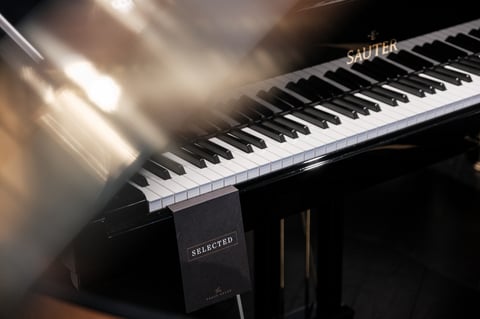
Add your piano details to a piano database
There are research databases dedicated to the cataloguing of pianos made before 1860. Pierce Piano Atlas is a reasonably accurate tool for identifying piano makers and their years of activity. They list dates of manufacture by serial number for hundreds of brands of modern and near-modern pianos.
Unfortunately, most of the piano makers listed will no longer be in business, which means there’s rarely a way to verify details any more, other than the piano’s approximate age.
Steinway, however, has kept very good records of its own instruments and if you have a Steinway serial number, its year of manufacture can be obtained from the factory. Alternatively, you can use the extensive list of Steinway serial numbers we have collated.
Part exchange your piano
If you are finding it difficult to sell your piano, part exchange may be a good option if you are looking to upgrade. A part exchange means a quick sale and means you can change your piano without the stress of trying to sell it yourself.
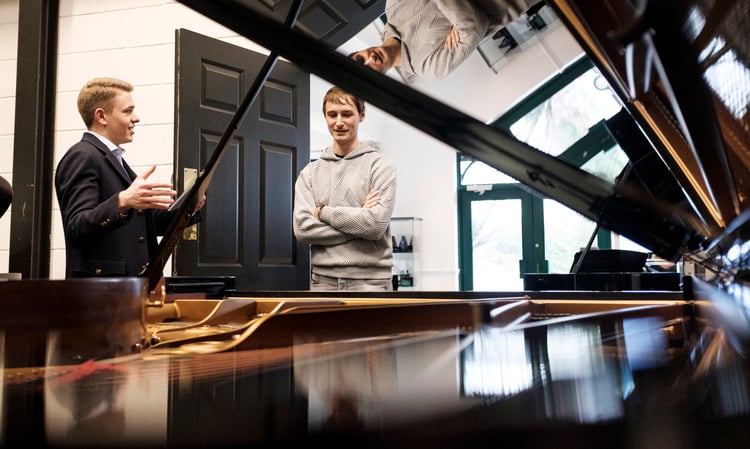
Sell your piano
There are many details to consider when looking to sell your piano and find a suitable buyer; having realistic expectations is important, as well as gaining knowledge of what is fair and accurate.
When corresponding with piano dealers be mindful of those that offer to sell a piano on your behalf without a guaranteed underwritten purchase price. As previously noted, it is also important to be aware of the potential issues of selling at auction.
Being as well-informed as possible, and picking up tips from this article will help you get the best possible price for your piano and, hopefully, help when you are selling a piano and saying goodbye to what might have been a long-standing friend in your home.
Recommended
Articles
Shigeru Kawai vs. Steinway & Sons – Battle of the Brands
6 things to look for when buying a second hand piano
Back to Blog





